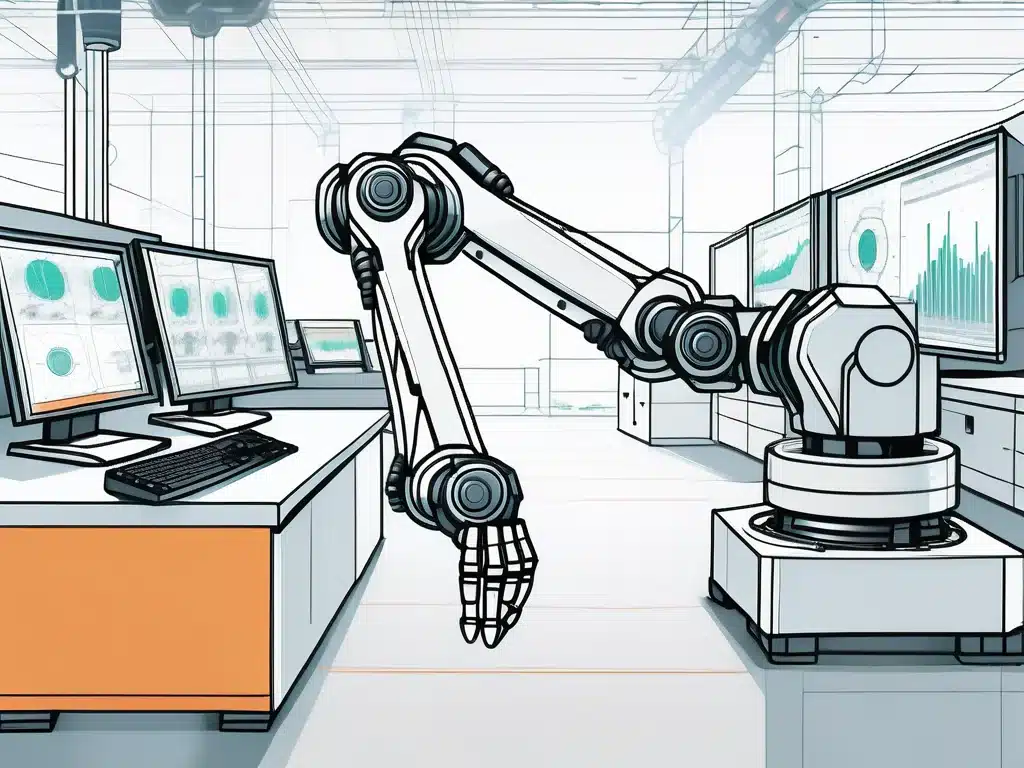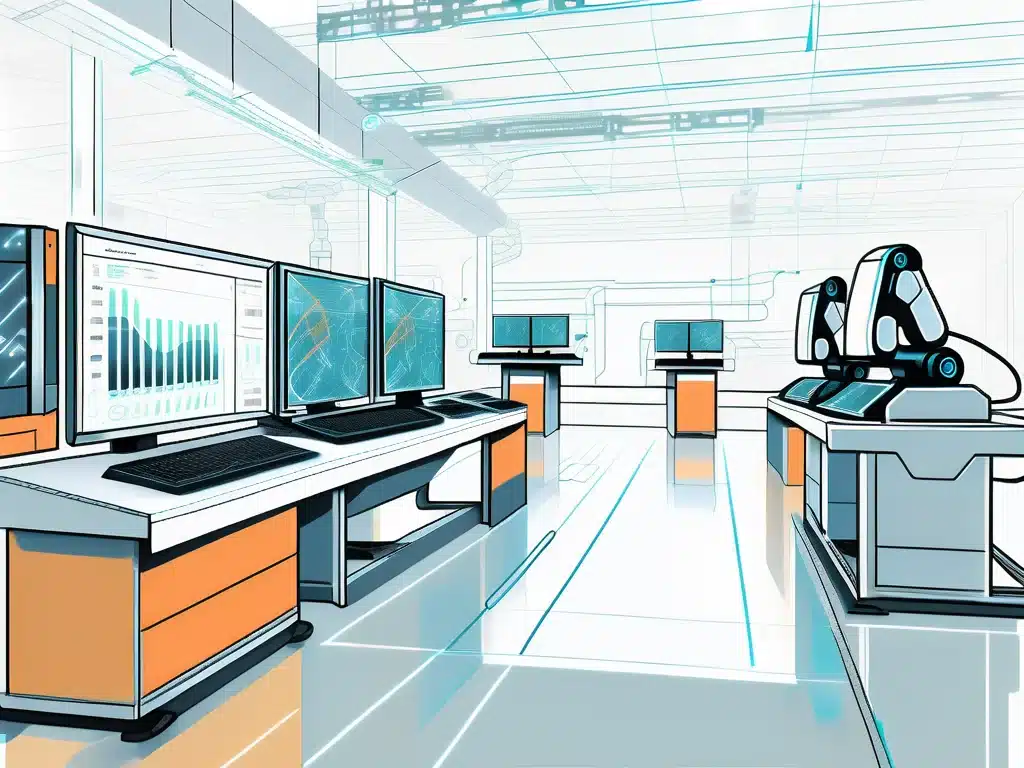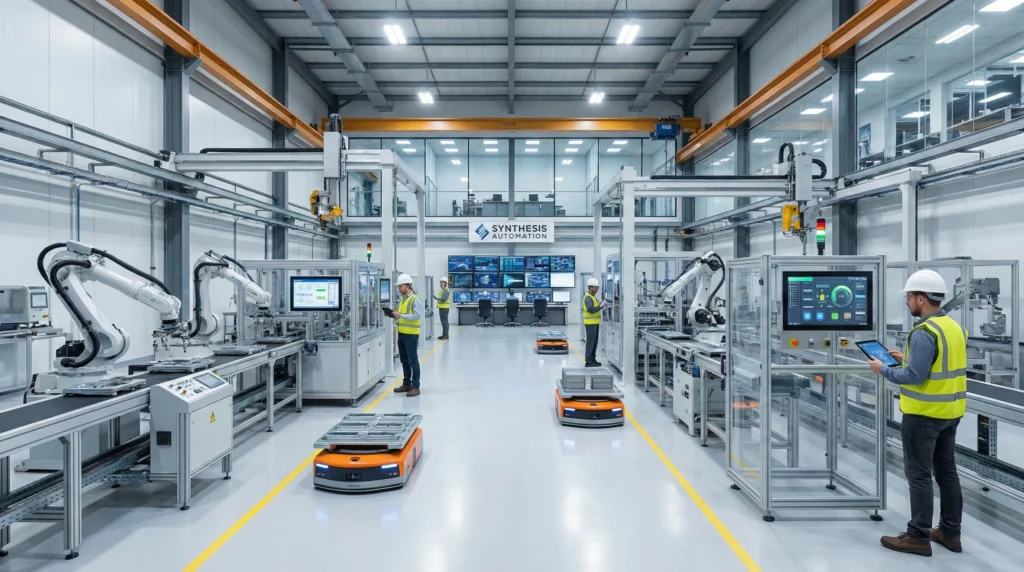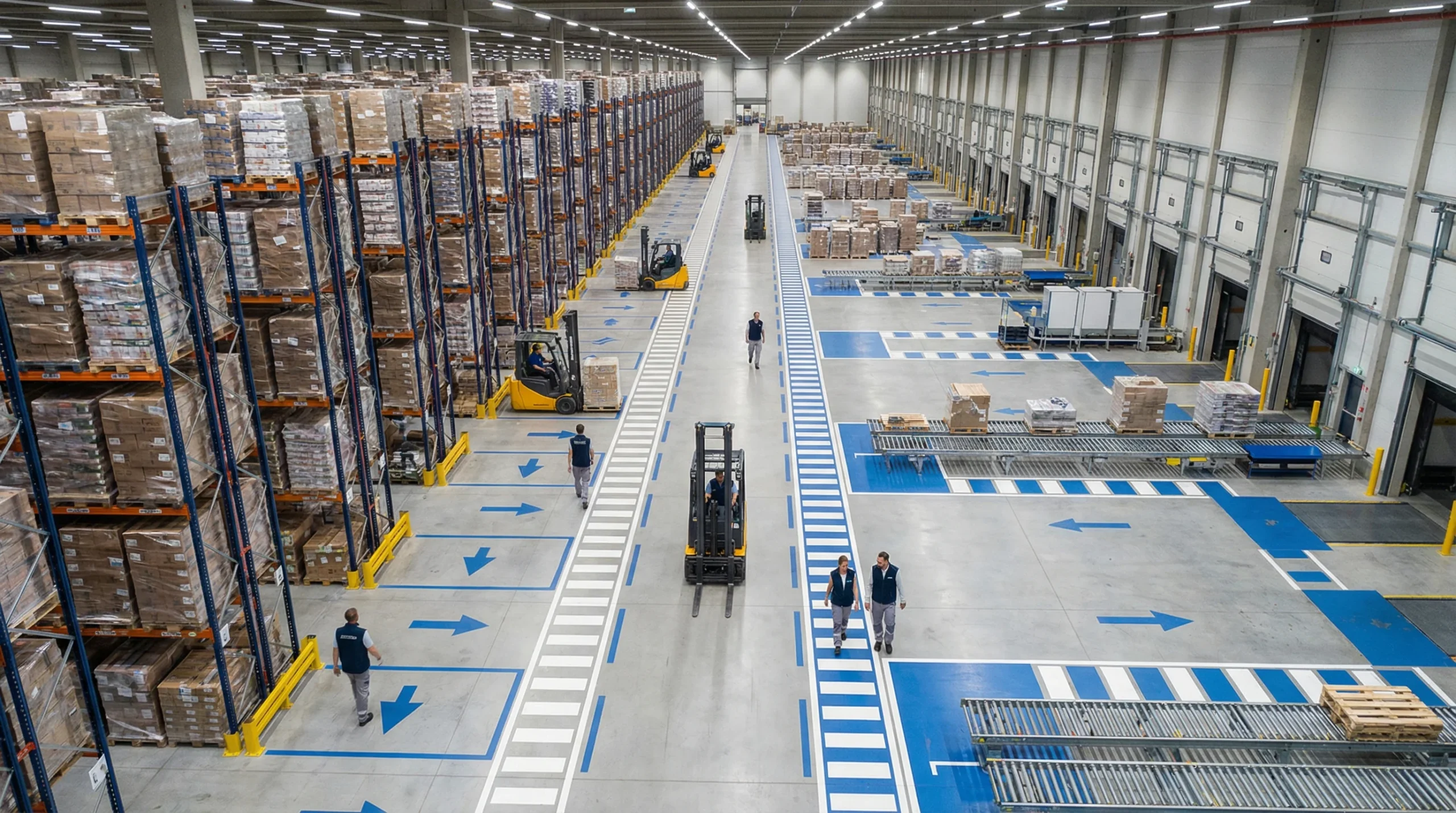In today’s rapidly evolving manufacturing industry, the role of shop floor control systems is becoming increasingly important. These systems, also known as manufacturing execution systems (MES), play a crucial role in streamlining and optimizing production processes. By integrating data from various sources across the shop floor, they enable real-time monitoring, control, and coordination of manufacturing operations. In this article, we will explore the role of shop floor control systems in manufacturing, their key components, the evolution of these systems, their benefits, challenges in their implementation, and the future outlook for this technology.
Understanding Shop Floor Control Systems
Effective management of shop floor operations is essential for manufacturing companies to stay competitive in today’s global market. Shop floor control systems serve as the backbone of this management process, providing real-time visibility and control over various aspects of production. These systems enable manufacturers to monitor and manage production orders, track work in progress (WIP), allocate resources, and optimize production schedules.

The Role of Shop Floor Control Systems in Manufacturing
Shop floor control systems play a vital role in ensuring efficient and smooth production operations. They provide a centralized platform for collecting and analyzing data from multiple sources, such as machines, sensors, and workers. By integrating this data, manufacturers can gain valuable insights into their production processes, identify bottlenecks, and make data-driven decisions to improve efficiency and productivity.
Key Components of Shop Floor Control Systems
Shop floor control systems consist of various interconnected components that work together to enable seamless production operations. Some of the key components include:
- Work Order Management: This component allows manufacturers to create, allocate, and manage work orders throughout the production process. It ensures that tasks are scheduled appropriately, resources are allocated efficiently, and deadlines are met.
- Real-time Monitoring: Real-time monitoring enables manufacturers to track the status of production processes and equipment in real-time. By providing live updates, this component allows swift identification and resolution of issues, reducing downtime and improving overall productivity.
- Inventory Management: Shop floor control systems facilitate the management of inventory levels, ensuring that raw materials and components are available when needed. This component helps prevent stockouts and minimizes inventory holding costs.
- Data Analytics: Advanced analytics capabilities allow manufacturers to analyze production data and gain valuable insights. By leveraging this component, manufacturers can identify patterns, predict production outcomes, and optimize processes for better performance.
Let’s dive deeper into each of these components to understand their significance in shop floor control systems.
Work Order Management
Work order management is the foundation of shop floor control systems. It enables manufacturers to create, allocate, and manage work orders throughout the production process. This component ensures that tasks are scheduled appropriately, resources are allocated efficiently, and deadlines are met. By having a centralized system to manage work orders, manufacturers can streamline their production operations, minimize errors, and improve overall productivity.
Real-time Monitoring
Real-time monitoring is a crucial component of shop floor control systems as it allows manufacturers to track the status of production processes and equipment in real-time. By providing live updates, this component enables swift identification and resolution of issues, reducing downtime and improving overall productivity. Manufacturers can closely monitor key performance indicators (KPIs), such as cycle time, machine utilization, and production yield, to ensure optimal performance and make timely adjustments when necessary.
Inventory Management
Inventory management is another critical component of shop floor control systems. It facilitates the management of inventory levels, ensuring that raw materials and components are available when needed. By having accurate and up-to-date information about inventory levels, manufacturers can prevent stockouts, minimize excess inventory, and optimize their supply chain. This component helps manufacturers strike a balance between maintaining sufficient inventory to meet production demands and avoiding unnecessary holding costs.
Data Analytics
Data analytics capabilities are becoming increasingly important in shop floor control systems. This component allows manufacturers to analyze production data and gain valuable insights into their operations. By leveraging advanced analytics techniques, manufacturers can identify patterns, predict production outcomes, and optimize processes for better performance. Data analytics also enables manufacturers to detect anomalies, such as equipment failures or quality issues, in real-time, allowing for proactive maintenance and quality control.
In conclusion, shop floor control systems are essential tools for manufacturing companies to effectively manage their production operations. By incorporating components such as work order management, real-time monitoring, inventory management, and data analytics, manufacturers can achieve greater efficiency, productivity, and competitiveness in today’s dynamic market.
Take Control of Your Shop Floor
From production scheduling to quality control, ASCTrac MES gives manufacturers the tools to optimize every step.
Request a Demo
The Evolution of Shop Floor Control Systems
Over the years, shop floor control systems have undergone significant transformations, adapting to the changing needs and advancements in technology. Let’s explore the evolution of these systems.
As manufacturing processes became more complex and demanding, the need for greater efficiency and accuracy in shop floor operations became apparent. This led to a shift from manual to automated systems, marking a significant turning point in the history of manufacturing. Automated shop floor control systems streamlined production processes, reduced human error, and improved overall productivity.
From Manual to Automated Systems
In the past, shop floor control systems operated largely on manual processes, relying on physical paperwork and human intervention. However, with the introduction of computer-based systems, manufacturers began automating various aspects of production management. This automation brought significant improvements in efficiency, accuracy, and scalability.
With the rise of Industry 4.0, shop floor control systems have evolved even further, incorporating advanced technologies such as artificial intelligence and predictive analytics. These technologies enable real-time monitoring and decision-making, allowing manufacturers to optimize their production processes and respond swiftly to changing market demands.
The Impact of Technology on Shop Floor Control
Advancements in technology have played a crucial role in reshaping shop floor control systems. The introduction of machine-to-machine communication, Internet of Things (IoT), and cloud computing has revolutionized how manufacturers manage and control their shop floor operations.
Furthermore, the integration of data analytics and digital twin technology has enabled manufacturers to create virtual replicas of their shop floor environments. This digital representation allows for simulation, analysis, and optimization of production processes, leading to increased efficiency and cost savings.
Benefits of Modern Shop Floor Control Systems
Modern shop floor control systems offer numerous benefits to manufacturing companies. Let’s explore some of the key advantages.
Implementing a modern shop floor control system can also lead to enhanced employee satisfaction and engagement. By streamlining processes and providing workers with real-time insights and feedback, these systems empower employees to make data-driven decisions and contribute more effectively to the production process. This increased sense of ownership and involvement can boost morale and motivation among the workforce, ultimately leading to a more efficient and harmonious work environment.
Efficiency and Productivity Gains
By providing real-time visibility into production processes, shop floor control systems help manufacturers identify inefficiencies and optimize operations. Real-time monitoring, automated data collection, and advanced analytics enable manufacturers to make informed decisions, reduce downtime, and increase overall productivity.
Furthermore, modern shop floor control systems often come equipped with predictive maintenance capabilities, allowing manufacturers to anticipate equipment failures before they occur. By leveraging predictive analytics and machine learning algorithms, companies can schedule maintenance activities proactively, minimizing unplanned downtime and extending the lifespan of critical machinery. This proactive approach not only enhances operational efficiency but also reduces maintenance costs in the long run.
Improved Quality Control
Shop floor control systems facilitate better quality control by enabling real-time data collection and analysis. By monitoring process variables and equipment performance, manufacturers can detect deviations from desired specifications, take corrective actions promptly, and ensure consistent product quality.
Challenges in Implementing New Control Systems
While modern shop floor control systems offer significant benefits, their implementation can be challenging for manufacturing companies. Let’s explore some common challenges and how to overcome them.

Overcoming Resistance to Change
Introducing new technologies and processes often faces resistance from employees who are accustomed to traditional methods. To overcome this challenge, companies should communicate the benefits of shop floor control systems to their workforce, provide proper training and support, and involve employees in the implementation process.
Ensuring System Compatibility and Integration
Integration with existing systems and equipment can be a complex task. Manufacturers need to ensure that their shop floor control systems are compatible with their ERP (Enterprise Resource Planning) systems, machines, sensors, and other devices. Thorough planning, collaboration with vendors, and rigorous testing can help overcome compatibility and integration challenges.
The Future Outlook for Shop Floor Control Systems
As technology continues to advance, the future of shop floor control systems holds immense potential for further improving manufacturing operations. Let’s explore some of the key developments on the horizon.

The Role of Artificial Intelligence and Machine Learning
Artificial Intelligence (AI) and Machine Learning (ML) are poised to transform shop floor control systems. These technologies enable automation, predictive analytics, and adaptive decision-making, leading to enhanced efficiency and productivity. AI-powered systems can analyze vast amounts of production data, detect patterns, and make predictions to optimize operations.
The Potential of Internet of Things (IoT) in Manufacturing
The Internet of Things (IoT) is revolutionizing the manufacturing industry. IoT devices connected to shop floor control systems enable real-time data collection, remote monitoring, and predictive maintenance. By leveraging IoT, manufacturers can optimize equipment performance, prevent breakdowns, and improve overall equipment effectiveness (OEE).
Conclusion
In conclusion, shop floor control systems are playing a crucial role in shaping the future of manufacturing. With their ability to provide real-time visibility, control, and optimization of production operations, these systems are empowering manufacturers to streamline processes, improve efficiency, and deliver higher quality products. As technology continues to advance, the potential for further innovation and improvement in shop floor control systems is limitless. Manufacturers who embrace these advancements stand to gain a competitive edge in the ever-evolving manufacturing landscape.
Frequently Asked Questions
How is shop floor control technology evolving?
Evolution includes greater connectivity through Industrial Internet of Things, cloud-based deployment options, mobile interfaces for workers, and advanced analytics powered by artificial intelligence. Integration with automation and robotics extends control capabilities. These technologies enable more responsive, data-driven manufacturing operations.
What role will artificial intelligence play in shop floor control?
AI will enhance scheduling optimization, predict equipment failures before they occur, identify quality issues from sensor data patterns, and recommend process improvements. Machine learning algorithms will improve over time as they process more production data. Human expertise will remain essential for exception handling and strategic decisions.
How does the Industrial Internet of Things affect shop floor control?
IIoT connects machines, sensors, and devices to collect data automatically without manual entry. This enables real-time visibility into equipment status, environmental conditions, and production progress. The volume and timeliness of data supports better decisions and enables automation of routine monitoring and response activities.
What is the future of human roles in shop floor control?
Humans will shift from data collection and routine monitoring to exception handling, problem-solving, and continuous improvement. Workers will need skills to interpret data, configure systems, and collaborate with automated equipment. The combination of human judgment and machine capabilities will outperform either alone.
How will cloud technology change shop floor control?
Cloud deployment reduces infrastructure requirements and enables easier updates and scaling. Multi-site manufacturers gain enterprise-wide visibility through centralized platforms. Cloud computing power supports advanced analytics that would be impractical on-premise. Security and reliability concerns are addressed through mature cloud provider capabilities.




